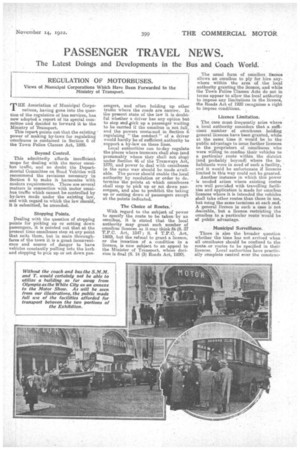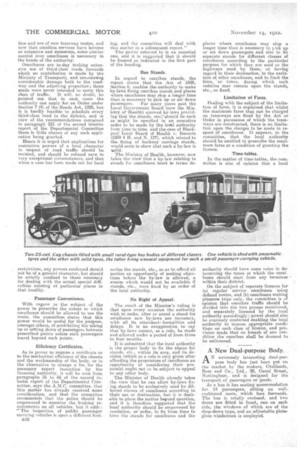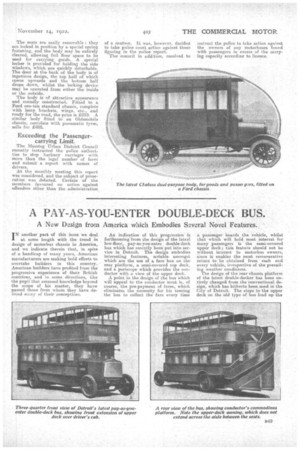PASSENGER TRAVEL NEWS.
Page 25

Page 26

Page 27

If you've noticed an error in this article please click here to report it so we can fix it.
The Latest Doings and Developments in the Bus and Coach World.
REGULATION OF MOTORBUSES.
Views of Municipal Corporations Which Have Been Forwarded to the Ministry of Transport.
THE Association of Municipal Corporations, having gone into the question of the regulation of bus services, has now adopted a report of its special committee and decided to forward it to the Ministry of Ikransport.
This report points out that the existing power of making by-laws for regulating omnibuses is contained in Section 6 of the Town Police Clauses Act, 1889.
Beyond Control.
This admittedly affords insufficient scope for dealing with the motor omnibus traffic, and no doubt the Departmental Committee on Road Vehicles will recommend the revisions necessary in Section 6 to make it harmonize with modern requirements. There are several matters in connection with motor omnibus traffic which cannot be controlled by lay-laws made under the existing law, and with regard to which the law should, it is submitted, be amended.
Stopping Points.
Dealing with the question of stopping points for picking up or setting down passengers, it is pointed out that at the present time omnibuses stop at any point that suits them, but in main thoroughfares of the town it is a great inconvenience and source of danger to have vehicles constantly pulling into the kerb and stopping to pick up or set down pas
sengers, and often holding up other traffic where the roads are narrow. In the present state of the law it is doubtful whether a driver has any option but to stop mad kick up a passenger waiting to be carried if the omnibus is not full, and the powers contained in Section 6 regulating " the conduct" of a driver would hardly be of sufficient authority to support a by-law on these lines.
Local authorities can to-day regulate the places where tramcars shall stop (and presumably where they shall not stop) under Section 46 of the Tramways Act, 1870, and power to deal with omnibuses in the same way should be made available. The power should enable the local authority by resolution or order to determine the points at which omnibuses shall stop to pick up or set down passengers, and also to prohibit the taking up or setting clown of passengers except at the points indicated.
The Choice of Routes.
With regard to the subject of power to specify the route to be taken by an omnibus, it is stated that the local authority may grant such number of omnibus licences as it may think fit (S. 37 T.P.C. Act, 1847; S. 4 T.P.O. Act, 1889, but the refusal to grant a licence, or the insertion of a condition in a licence, is now subject to an appeal to the Minister of Transport, whose decision is final (S. 14 (3) Roads Act, 1920).
The usual form of omnibus licence allows an omnibus to ply for hire anywhere within the area of the local authority granting the licence, and while the Town .Police Clauses Acts do not in terms appear to allow the local authority to impose any limitations in the licence, the Roads Act of 1920 recognizes a right to impose conditions.
Licence Limitation.
The case must frequently arise where a local authority considers that a sufficient number of omnibuses holding general licences have been granted, while at the same time it would be to the public advantage to issue further licences to the proprietors of omnibuses who were willing to confine their vehicles to a particular route within the district (and probably beyond) where the inhabitants were in need of such a facility, and it would be unfortunate if licences limited in this way could not be granted.
Another instance in which this power is needed arises where existing routes are well provided with travelling facilities and application is made for omnibus licences where it is intended the vehicles shall take other routes than those in use, but using the same terminus at each end. A general licence in such a case is not desirable, but a licence restricting the omnibus to a particular route•would be el public advantage.
Municipal Surveillance.
There is also the broader question whether the time has not arrived when all omnibuses should be confined to the route or routes to be specified in their licences. Local authorities have practically complete control ever the construe
tion and use of new tramway routes, and now that omnibus services have become so extensive and numerous, some similar control over omnibuses is necessary in the hands of the authority:
Omnibuses are to-day making extensive use of third-elaas roads (towards which no contribution is made by the Ministry of Transport), and are..causing considerable damage both to the roadway and the adjoining properties; these roads were never intended to carry this class of traffic. It will, no doubt, be pointed out that in such, cases the authority can apply for an Order .under Section 7 (4) of the Roads Act, 1920, but it is hardly feasible to schedule every third-class road in the district, and in view of the recommendationscontained in paragraph 221 of the second interim report of the Departmental Committee there is little chance of any such application being granted.
Hence it is urged that applications for restrictive powers of a local character in respect of road traffic should be resisted, and should be refused save in very exceptional circumstances, and that when a case has been made outfor local restrictions, any powers conferred should riot be of a general character, but should be strictly confined to those necessary for dealing with the actual special diffieu/ties existing at particular places in that locality.
Passenger Convenience.
With regard to the subject of the power to prescribe the extent to which omnibuses should be allowed to use the mate; the committee. states that this power would be useful for the purpose, amongst others, of prohibiting the taking up or setting down of passengers between prescribed points unless such passengers travel beyond such points.
Efficiency Certificates.
As to power to require a certificate as to the mechanical efficiency of the chassis and the workmanship of the body, or in the alternative to charge a fee for the necessary expert inspection by the licensing authority, it will be seen from paragraphs 56 to 66 of the second in terim report of the Departmental Committee, says the A.M.C. committee, that this matter has already received some consideration, and that the committee recommends that the police should be empowered to examine the braking requirements on all vehicles, but it adds: " The inspection of pubkc passenger carrying vehicles is upon a different foot s/2 ing, and the committee will deal with this matter in a subsequent report.'
The power referred to is an essential one, and it is suggested that it should be framed as indicated in the first part of the heading.
Bus Stands.
In regard to omnibus stands, the report states that the Act of 1889, Section 6, enables the authority to make by-laws fixing omnibus stands and places where omnibuses may stop a longer time than is necessary to pick up or set down
passengers. For many years past the Local Government Board (now the Ministry of .Health) allowed by-laws provid-. ing that the stands, eto:shatild be such as might be specified in an executive order to be made by the loe*al authority from time to Ums and the case of Blackpool LoCal RoUrd of Health v: Bennett (1859 4 H. and N. 127), which related to the . fixing of hackney carriage stands, would seem to show that such a by-law is
• The Ministry of Health, however, now takes the view that a by-law relating to stands for omnibuses must in terms de scribe the stands, etc., so as to afford all parties an opportunity of making objections before the by-law is allowed, a course which would not be available if stands, etc., were fixed by an order of the local authority.
No Right of Appeal.
The result of the Minister's ruling is that upon every occasion the authority wish to make, alter or annul a stand for omnibuses new by-laws are necessary, with all its attendant formalities and delays. It is no exaggeration to say that by-laws cannot, as a rule, be made and allowed under a period of from three to four months, It is submitted that the local authority is lho proper body to fix the places for stands, etc., within its area, and its decision (which as a rule is only given after affording the proprietors of omnibuses an opportunity of considering their proposals) ought not to be subject to appeal to any other body.
. The Minister of Health already takes the view that he can allow by-laws fixing stands to be exclusively used by different classes of omnibuses according to their use or destination, but it is desirable to place the matter beyond question, and it is therefore suggested that the local authority should be empowered by resolution, or order, to fix fromtime to tinie the stands for omnibuses and the
places where omnibuses may step a longer time than is necessary to Fick up or set down passengers and also to fix separate stands for different classes of omnibuses according to the particular purpose for which they are used or the highways used by them, or having regard to theirdestination, to the exclusion of other omnibuses, and to limit the time, or times, during which such vehicles may remain upon the stands, etc., so fixed.
Limitation of Pares.
Dealing with the subject of the limitation of fares, it is explained that whilst the maximum fares that can be charged on tramways are fixed by the Act or Order in pursuance of which the tramways are constructed, there is no limitation upon the charges to be made in respect of omnibuses. It appears, to the committee, that the local authority should be entitled to prescribe the maximum fares as a condition of granting the licence.
Time-tables.
In the matter of time-tables, the committee is also of opinion that a local authority should have some voice in determining the times at which"the omnibuses should start from any terminus within their district.
On the subject of separate licences for (a) regular service omnibuses using defined routes, and (b) omnibuses making pleasure trips only, the committee is of opinion that omnibus traffic should be divided into the two groups mentioned, and separately licensed by the local .authority accordingly: power should also be expressly conferred enabling the local authority to impose appropriate conditions on each class of licence, and provision made that on breach of any condition the omnibus shall be deemed to be unlicensed.
A New Dual-purpose Body. _
N extremely interesting dual-purpose body has just been put on the • market by the makers, Challinds, Ross and Co., Ltd,, 28, Canal Street, Nottingham, and is designed. for the transport of passengers or goods. As a bus it has seating accommodation for 14 passengers, sitting on wellcushioned seats, which face forwards. The has is totally enoloeod, and two doors are fitted in front., one on each side, the windows of which are of the drop-down type., and an adjustable plateglass windscreen is employed. The seats are easily removable : they are locked in position by a special spring fastening, and the body may be entirely cleared, allowing full floor space to be used for carrying goods. A special locker is provided for holding the side windows, which are quickly detachable. The door at the back of the body is of ingenious design, the top half of which opens upwards and the bottom half drops down, whilst the locking device may be operated from either the inside or the outside.
The body is of attractive appearance and .soundly constructed. Fitted to a Ford one-ton standard chassis, complete with lamp brackets, wings, etc., and ready for the road, the price is £310. A similar body fitted to an Oldsmobile chassis, complete with pneumatic tyres, sells fee £495.
Exceeding the Passengercarrying Limit.
The Macsteg Urban District Connell recently instructed the police authorities to stop hackney carriages with more than the legal number of fares and submit a report with names of drivers.
At the monthly meeting this report was considered, and the subject of prosecution was debated. Certain of the members favoured no action against offenders other than the administration.
of a caution. It was, however, decided to take police court action against those figuring in the police report. The council in addition, resolved to instruct the police to take action against the owners of any motorbuses found with passengers in eiceess of the carrying capacity according to licence.
































